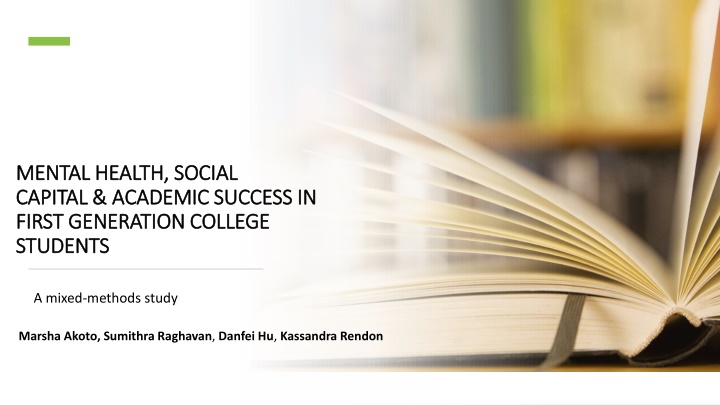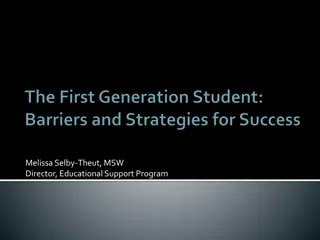Mental Health, Social Capital, and Academic Success in First-Generation College Students
This study examines the impact of social capital on mental health and academic performance in first-generation college students. It explores the role of university engagement in fostering a sense of belonging and its implications for student success. The research delves into the challenges faced by FGCS due to underpreparedness, work commitments, and low family income, aiming to identify strategies to enhance their well-being and educational outcomes.
Download Presentation

Please find below an Image/Link to download the presentation.
The content on the website is provided AS IS for your information and personal use only. It may not be sold, licensed, or shared on other websites without obtaining consent from the author.If you encounter any issues during the download, it is possible that the publisher has removed the file from their server.
You are allowed to download the files provided on this website for personal or commercial use, subject to the condition that they are used lawfully. All files are the property of their respective owners.
The content on the website is provided AS IS for your information and personal use only. It may not be sold, licensed, or shared on other websites without obtaining consent from the author.
E N D
Presentation Transcript
MENTAL MENTAL HEALTH, CAPITAL CAPITAL & ACADEMIC SUCCESS IN & ACADEMIC SUCCESS IN FIRST GENERATION COLLEGE FIRST GENERATION COLLEGE STUDENTS STUDENTS HEALTH, SOCIAL SOCIAL A mixed-methods study Marsha Akoto, Sumithra Raghavan, Danfei Hu, Kassandra Rendon
Introduction NCES estimates 1/3 college students are first generation (FGCS) and are a vulnerable cohort Academically underprepared, full time jobs & family commitments (Cataldi, Bennett & Chen, 2018; Collier & Morgan, 2008; Collier & Morgan 2005; Choy, 2001) Low family income, racial and ethnic minority status Mental health: lower sense of belonging and higher levels of anxiety and depression (Stebleton, Soria & Heusman, 2014). Lower likelihood of graduation--only 27.4% of FGCS graduate in four years (DeAngelo, Franke, Hurtado, Pryor & Tran, 2011), a substantially lower rate than their continuing generation peers (Cataldi, Bennett & Chen, 2018).
Social Capital Theory Social capital theory states that networks of relationships can help people navigate unfamiliar environments, and absence of social capital may provide one explanation for poor performance of FGCS Research on social capital interventions in first generation ethnic minority students shows mentorship programs are especially promising (Smith, 2007), but research on broader FCGS cohorts is more limited (Moschetti & Hudley, 2015). Tinto (1993) describes college retention as related to academic, individual & social characteristics We consider mental health as individual characteristic, and university engagement as a social characteristic that can impact mental health University engagement may help students acquire social capital which impacts academics, mental health and overall retention
Our Hypothesis Social capital, in the form of engagement with university services, has positive implications for mental health and academic performance for all college students, but is particularly impactful for FGCS Via qualitative interviews, we explore the nature of student s sense of belonging on campus and how this relates to their mental health & academic performance
Methods Pts recruited in undergrad psych courses and compensated with course credit Concurrent triangulation design for mixed methods research: Online survey plus open ended qualitative interview w/ additional questions for FGCS Measures included: demographics, Clance Imposter Syndrome Scale, Student Instructor Relationship Scale, Brief Symptom Inventory, Qualitative Interview featuring questions about student life and experiences with engagement. Additional questions for FGCS about their experiences
Methods cont. Inferential statistics: correlations among all variables, group differences on social capital (engagement), mental health (belonging, imposter syndrome, general symptoms) and academics (GPA). Regressions to model whether FGCS or CGCS moderated relationship between these variables. Qualitative analyses: consensual qualitative analyses with some a priori themes, multiple raters and levels of coding to arrive at consensus regarding themes
Qualitative Data All students described academic stress and anxiety related to a lack of time. Many reported pre-existing clinical diagnoses that were exacerbated by academic anxiety. Multiple students described engagement as increasing their sense of belonging; those not engaged attribute this to lack of time. While minority students were present in both cohorts, FGCS were more likely to report acculturation challenges.
Qualitative Data cont. There are noticeable thematic differences between FGCS and CGCS. Some of these differences include: FGCS report more stress and mental health challenges, due to parental lack of knowledge about the college process. " [my mom] she doesn't know like the steps that I need to make in order to do all of that or why am I m spending too much time in college. FGCS articulate using a variety of resources, particularly communities of like-minded people We went through the whole entire program during the Summer, um, before freshman year we were forced to connect, but we did become friends it was basically the same story. Parents are from a different country, they came to America and stuff like that. -In contrast, CGCS were more aware of a resources but did not seek them I transferred here and orientation kind of broke it down for us, its just me that didn t seek out those activities.
Quantitative Results Academic performance: no significant difference between in FGCS vs CGCS on GPA Mental health: stat sig differences on depression subscale of BSI. FGCS also reported lower levels of belonging & greater minority student stress but results non-significant Social capital: FGCS accessed more social networks but difference non- significant
Quantitative Results cont. For FGCSs, social capital did not influence level of depression, = 0.08, t(11) = 0.82, p = 0.41; however, for CGCSs, a trending effect was observed such that social capital seemed to negatively predict depression, = -0.20, t(11) = -1.37, p = 0.17. That is, the more social networks CGCSs had, the less likely they would experience depression. Interaction trending to statistical significance between social capital and generation status on anxiety symptom, = -0.25, t(21) = -1.35, p = 0.19 (see Figure 2). Simple slopes analyses further showed that for FGCSs, social capital did not influence their level of anxiety, = -0.08, t(11) = -0.54, p = 0.59; however, for CGCSs, social capital negatively predicted their anxiety, = 0.17, t(11) = 1.68, p = 0.09, and this relationship was marginally significant
Discussion Hypotheses partially supported with clear patterns among narrative data: Students consider themselves more engaged on campus and report a sense of otherness be it due to ethnicity, race, gen status. Group differences on primary measures were non-significant, group means indicated that FGCS do feel a lower sense of belonging & report elevated levels of depressive symptoms. No differences in GPA may be due to early in college career.
Discussion cont. No difference on social capital-may relate to conceptualization of quantity vs quality, while FGCS felt their engagement had a profound impact even if quantity did not differ from CGCS. FGCS may be displaying grit and resilience, succeeding despite challenges, which may account for lack of significance in results. Despite lack of statistical significance, recent scholars i.e. Trafimow & Marks, 2015, suggest that effect size is a better indicator of the relationship between variables and all of our effect sizes were medium or large.
Limitations Operationalization of primary variables: social capital measures quantity not quality, broad picture of mental health but perhaps lacked clinical specificity Despite diffs in generational status, groups were similar in other areas especially self-described income level. Perhaps shared challenges of being lower income over-rode generational differences, which in turn questions our class vs culture question Sample size Despite limitations, narrative data supports our hypotheses that FGCS experience additional challenges that impact mental health & academics and report strong benefits from social networks.
Conclusions and Future Directions Power of community and increased opportunities for community building especially in first generation cohorts May provide a roadmap for programming for FGCS and families during first semester Most students regardless of generational status reported small benefit from university services- programming to encourage engagement? Incorporate assessments of grit into mixed-methods explorations of first-generation students Future research should broaden sample size and adjust operationalization of variables to allow for quality of support to be considered
References Cataldi, E. F., Bennett, C. T., & Chen, X. (2018). First-Generation Students: College Access, Persistence, and Postbachelor's Outcomes. Stats in Brief. NCES 2018- 421. National Center for Education Statistics. Choy, S. (2001). Students Whose Parents Did Not Go to College: Postsecondary Access, Persistence, and Attainment. Findings from the Condition of Education, 2001. Collier, P. J., & Morgan, D. L. (2008). Is that paper really due today? : differences in first-generation and traditional college students understandings of faculty expectations. Higher education, 55(4), 425-446. DeAngelo, L., Franke, R., Hurtado, S., Pryor, J. H., & Tran, S. (2011). Completing college: Assessing graduate rates at four-year institutions. Los Angeles, CA: Higher Education Research Institute, University of California, Los Angeles. Moschetti, R. V., & Hudley, C. (2015). Social capital and academic motivation among first-generation community college students. Community College Journal of Research and Practice, 39(3), 235-251. Smedley, D., Brian & Myers, Hector & Harrell, Shelly. (1993). Minority-Status Stress and the College Adjustment of Ethnic Minority Freshmen. The Journal of Higher Education. 64. 10.2307/2960051. Smith, B. (2007). Accessing social capital through the academic mentoring process. Equity & Excellence in Education, 40(1), 36-46. Stebleton, M. J., Soria, K. M., & Huesman Jr, R. L. (2014). First generation students' sense of belonging, mental health, and use of counseling services at public research universities. Journal of College Counseling, 17(1), 6-20. Tinto, V. (1993). Leaving college: Rethinking the causes and cures of student attrition (2nd ed.). Chicago, IL: University of Chicago Press.























